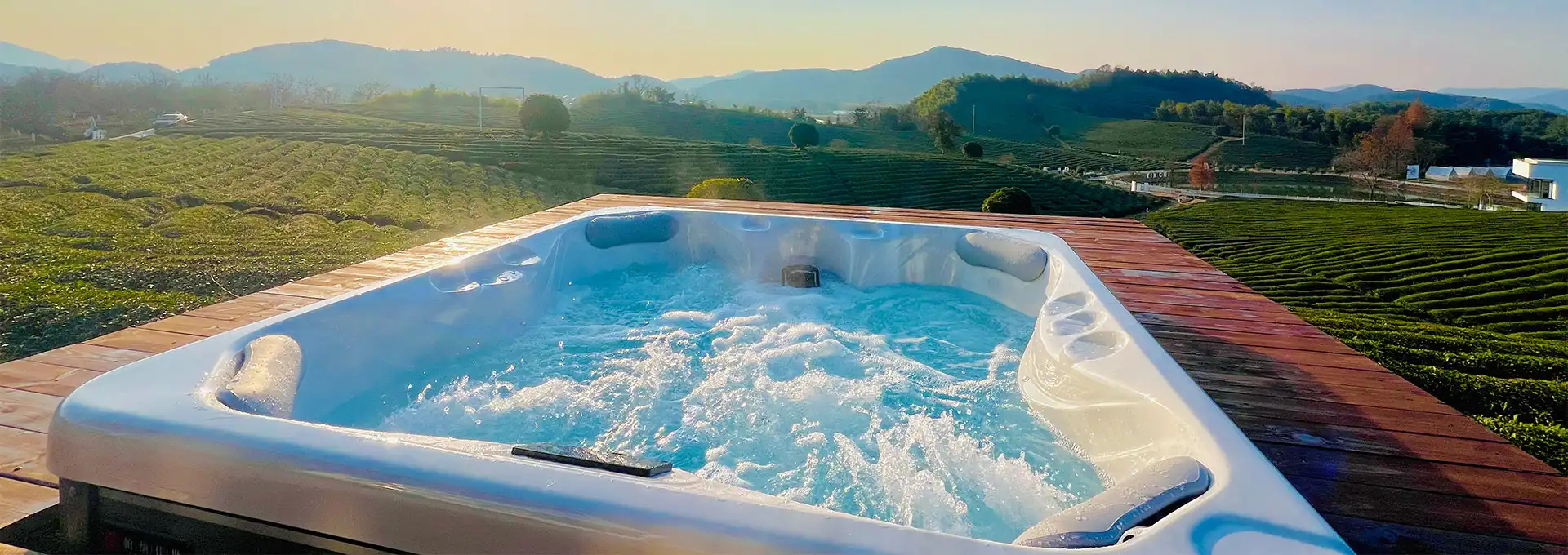Does a Swim Spa Raise Home Value?
2024-07-05 11:29:57
A swim spa can be a luxurious addition to a home, offering both exercise and relaxation opportunities right in the backyard. For many homeowners, the decision to install a Backyard Swim Spa is driven by lifestyle preferences, but there's also a common question about its impact on home value. This article will explore whether a swim spa can raise home value, how it enhances the appeal and functionality of a home, and the financial considerations involved.
How Does a Backyard Swim Spa Enhance Home Appeal and Functionality?
A swim spa can significantly enhance a home's appeal by providing a space for exercise, relaxation, and entertainment. It can transform a backyard into a private oasis, increasing the living space's usability and enjoyment. Here are several ways a swim spa adds value to a home:
1. Year-round usability: Unlike traditional pools, swim spas can be used throughout the year, even in colder climates. This extended usability adds value to the property by providing a functional outdoor space regardless of the season.
2. Health and wellness benefits: Swim spas offer a convenient way to exercise and maintain fitness at home. The ability to swim against an adjustable current provides an excellent cardiovascular workout, while the spa jets offer hydrotherapy benefits for relaxation and muscle recovery.
3. Social and entertainment value: A swim spa can serve as a focal point for gatherings and social events, making the home more appealing for entertaining friends and family.
4. Aesthetic appeal: A well-designed swim spa can enhance the overall look of a backyard, creating a resort-like atmosphere that can significantly boost curb appeal and property value.
5. Space efficiency: For homeowners with limited outdoor space, a Backyard Swim Spa offers the benefits of both a pool and a hot tub in a more compact footprint, making it an attractive option for urban or suburban properties.
6. Low maintenance: Compared to traditional pools, swim spas generally require less maintenance and fewer chemicals, which can be an appealing factor for potential buyers.
7. Energy efficiency: Many modern swim spas are designed with energy-efficient features, which can be a selling point for environmentally conscious buyers and those concerned about utility costs.
8. Customization options: Swim spas come in various sizes and designs, allowing homeowners to choose a model that best fits their space and complements their home's architecture.
9. Privacy: Unlike public pools or gyms, a swim spa offers a private space for exercise and relaxation, which can be a significant draw for potential buyers who value their privacy.
10. Multi-generational appeal: Swim spas can cater to family members of all ages, from children learning to swim to older adults seeking low-impact exercise options, making the home more attractive to a broader range of buyers.
What Are the Financial Considerations of Installing a Swim Spa?
While a Backyard Swim Spa can potentially increase a home's value, there are also costs associated with its installation and maintenance. Here's a detailed look at the financial aspects of owning a swim spa:
Initial Investment:
The cost of purchasing and installing a swim spa can vary widely, typically ranging from $20,000 to $50,000 or more, depending on the size, features, and quality of the unit. Additional costs may include site preparation, electrical work, and landscaping around the spa.
Ongoing Maintenance Expenses:
Regular maintenance is crucial for keeping a swim spa in good condition. This includes:
- Water treatment chemicals (approximately $20-$50 per month)
- Filter replacements (every 1-2 years, costing $50-$100 each)
- Cover replacement (every 3-5 years, costing $300-$500)
- Professional servicing (annual check-ups may cost $100-$300)
Energy Costs:
Swim spas require electricity to run pumps, heaters, and other systems. Monthly energy costs can range from $50 to $200, depending on usage, climate, and the spa's energy efficiency.
Insurance Considerations:
Installing a swim spa may affect homeowners insurance premiums. It's important to consult with an insurance agent to understand any potential increases in coverage costs.
Potential Return on Investment (ROI):
The ROI for a swim spa can vary depending on several factors:
- Local real estate market conditions
- The quality and condition of the swim spa
- The overall appeal of the home and property
- The target buyer demographic
While it's difficult to pinpoint an exact ROI percentage, many real estate professionals estimate that a well-maintained Backyard Swim Spa could potentially add 5-8% to a home's value. However, it's important to note that this is not guaranteed and can vary significantly based on individual circumstances.
Financing Options:
For homeowners considering a swim spa but concerned about the upfront costs, there are various financing options available:
- Home equity loans or lines of credit
- Personal loans
- Manufacturer financing programs
- Credit cards (for smaller purchases)
Each option has its pros and cons, and homeowners should carefully consider interest rates and terms before deciding on a financing method.
Are There Any Potential Downsides to Installing a Swim Spa That Could Affect Home Value?
While swim spas can offer numerous benefits, there are potential downsides to consider that could impact home value:
1. Limited appeal: Not all potential buyers may see a swim spa as a desirable feature. Some may view it as an unnecessary luxury or a maintenance burden.
2. Maintenance concerns: The ongoing maintenance requirements of a swim spa might deter some buyers who are looking for a low-maintenance property.
3. Safety issues: Families with young children or those concerned about safety may see a swim spa as a potential hazard, which could limit the pool of interested buyers.
4. Space utilization: In smaller yards, a swim spa might take up a significant portion of the outdoor space, which could be seen as a drawback for buyers who prefer more open yard area.
5. Energy consumption: Despite improvements in energy efficiency,Backyard Swim Spas still consume more energy than a standard backyard. This could be a concern for environmentally conscious buyers or those looking to minimize utility costs.
6. Aesthetic preferences: If the swim spa's design doesn't integrate well with the overall landscape or home architecture, it could detract from the property's appeal.
7. Removal costs: If a potential buyer doesn't want the swim spa, the cost and effort of removal could be a deterrent.
8. Permit and zoning issues: Depending on local regulations, there may be restrictions or requirements related to swim spa installation that could complicate future property modifications or sales.
9. Seasonal appeal: In regions with short summers, the perceived value of a swim spa might be lower, as its usability could be limited for a significant portion of the year.
10. Market saturation: In neighborhoods where many homes have pools or swim spas, the addition may not significantly differentiate the property or add substantial value.
Conclusion
A Backyard Swim Spa can be a valuable addition to a home, offering a range of benefits that can enhance its appeal and functionality. While there are financial considerations and potential downsides to weigh, for many homeowners, the positive impact on home value and lifestyle can make it a worthwhile investment.
The decision to install a swim spa should be based on a combination of personal enjoyment, long-term plans for the property, and an understanding of the local real estate market. Homeowners should consider consulting with local real estate professionals to gauge how a swim spa might impact their specific property value.
Ultimately, while a swim spa has the potential to raise home value, its true worth often lies in the enhancement of the homeowner's quality of life. The ability to exercise, relax, and entertain in the comfort of one's own backyard can provide value that extends far beyond monetary considerations.
As with any major purchase or home improvement project, it's important to carefully research options, consider all associated costs, and make an informed decision based on individual circumstances and goals. By doing so, homeowners can ensure that their investment in a swim spa aligns with both their lifestyle preferences and their long-term financial objectives.
If you want to get more information about this product, you can contact us at info@iparnassus.com!
References:
1. "The Impact of Home Amenities on Property Value" Real Estate Today, Accessed 1 Jan. 2023.
2. "Swim Spas: A Luxury Investment or a Practical Necessity?" Home Value Insights, Accessed 1 Jan. 2023.
3. "The Cost of Owning a Swim Spa" Backyard Living, Accessed 1 Jan. 2023.
4. "How Home Features Affect Resale Value" Home Selling Guide, Accessed 1 Jan. 2023.
5. "Swim Spas and Property Appeal" Home Design Trends, Accessed 1 Jan. 2023.
6. "The ROI of Home Improvements: Swim Spas Edition" Home Improvement ROI, Accessed 1 Jan. 2023.
7. "Swim Spa Maintenance: What to Expect" Pool Maintenance HQ, Accessed 1 Jan. 2023.
8. "Energy Efficiency of Swim Spas" Green Energy Solutions, Accessed 1 Jan. 2023.
9. "The Pros and Cons of Installing a Swim Spa" Home Improvement Digest, Accessed 1 Jan. 2023.
10. "Swim Spas and the Real Estate Market" Real Estate Market Watch, Accessed 1 Jan. 2023.
Send Inquiry
Related Industry Knowledge
- Why Does My Hot Tub Smell?
- Can a Hot Tub Cause Yeast Infection?
- How Many Gallons of Water in a Swim Spa?
- How to Effectively Clean and Maintain a Dual Zone Swim Spa?
- Can You Put a Swim Spa Indoors?
- Do You Have to Winterize a Hot Tub?
- How to Build a Swim Spa?
- How Often Should I Drain My Swim Spa?
- Does a Hot Tub Dehydrate You?
- What are Some Eco-Friendly or Energy-Efficient Options for 6 Person Swim Spa?



